Hi there! I’m here to answer a common question that many people have: Does washing fruit remove pesticides? As someone who cares about their health and wants to make informed choices about the food they eat, this is an important topic to explore.
When it comes to removing pesticides from fruits and vegetables, washing is indeed a helpful step. According to the FDA, washing with water can reduce dirt, germs, and pesticide residues on the surface of fresh produce. It’s a simple and accessible way to minimize your exposure to these potentially harmful substances.
However, it’s important to note that washing alone is not a foolproof method. While it can reduce pesticide residues, it may not eliminate them entirely. Some residues can penetrate the skin or be absorbed into the flesh of the fruit, making them difficult to wash away completely.
With that in mind, here are a few tips to make your fruit washing routine more effective:
1. Use running water: Washing and rubbing produce under running water is more effective than dunking. The force of the water helps to dislodge any residues and wash them away.
2. Wash all produce: Even if you don’t plan to eat the skin, it’s still important to wash all fruits and vegetables under running water. This helps prevent the transfer of any contaminants from the surface to the flesh when cutting or peeling.
3. Skip the soap: While you might think that washing with soap or commercial produce wash is more effective, it’s not recommended. These products have not been proven to be more effective than water alone and may leave behind residues of their own.
Key Takeaways:
- Washing fruits and vegetables can help reduce pesticide residues, but it may not eliminate them entirely.
- Using running water and rubbing produce under the water is more effective than dunking.
- All produce should be washed, even if you don’t plan to eat the skin.
- Avoid using soap or commercial produce wash, as they may not be more effective and can leave residues behind.
- While washing is important, it’s crucial to remember that organic produce can also contain pesticide residues, so washing is necessary regardless of the farming method.
Understanding Pesticide Residues on Fruits and Vegetables
When we consume fresh fruits and vegetables, we aim to nourish our bodies with essential nutrients and vitamins. However, it’s important to understand that these natural products can also harbor pesticide residues. Pesticides are chemicals used in farming to control pests and ensure crop yield. As a result, pesticide residues can be found on the surfaces of fruits and vegetables. Let’s delve deeper into the topic of pesticide residues and how they are regulated to ensure food safety.
The regulation of pesticide residues falls under the purview of organizations such as the Food and Drug Administration (FDA), the United States Department of Agriculture (USDA), and the Environmental Protection Agency (EPA). These agencies set tolerances, which are the maximum levels of pesticide residues allowed on foods. The goal of these regulations is to provide a “reasonable certainty of no harm” from consuming small amounts of pesticides in food. By implementing tolerances, the FDA, USDA, and EPA work to safeguard public health and maintain food safety standards.
Regardless of whether the produce is sourced from a farmers’ market, home garden, or grocery store, pesticide residues can be present. Therefore, it is important to adopt effective practices to reduce pesticide residues on the fruits and vegetables we consume. One such practice is washing produce thoroughly before consumption.
By washing fruits and vegetables, we can help remove not only dirt and germs but also pesticide residues present on the surface. Although washing cannot eliminate all pesticide residues entirely, it plays a crucial role in reducing their presence. Therefore, it is essential to incorporate washing as a routine step in our food preparation process.
To summarize, pesticide residues can be found on fruits and vegetables due to the use of pesticides in farming. The FDA, USDA, and EPA regulate the amount of pesticide residue allowed on foods to ensure food safety. Washing fruits and vegetables, regardless of their source, is crucial for reducing pesticide residues and maintaining a safer food supply.
Washing Fruits and Vegetables: Best Practices
When it comes to washing fruits and vegetables, following the best practices can help ensure that you remove any potential dirt, germs, and pesticide residues. The FDA recommends the following steps:
- Handwashing: Before and after handling fresh produce, it’s important to wash your hands with soap and warm water. This helps reduce the risk of transferring any bacteria or contaminants.
- Running water: Regardless of whether you plan to eat the skin or not, the FDA recommends washing fruits and vegetables under running water. This helps remove any visible dirt or debris.
- Scrubbing: For firm produce like melons and potatoes, using a clean brush to scrub the surface can help remove residues and any dirt that might be stuck. Make sure to rinse thoroughly after scrubbing.
- Rubbing: For soft produce like grapes or berries, rubbing them gently under running water can help remove residues. Be sure to handle the produce carefully to avoid damaging it.
It’s important to note that washing with soap, detergent, or commercial produce wash is not recommended by the FDA. These alternatives have not been proven to be more effective than water alone in removing pesticide residues. Therefore, sticking to water and the above best practices is sufficient.
Remember, washing your fruits and vegetables is an essential step in maintaining food safety and reducing the risk of pesticide exposure. Incorporating these best practices into your routine ensures that you can enjoy your produce with peace of mind.
Why Is Proper Washing Important?
“Washing fruits and vegetables under running water helps remove dirt, germs, and pesticide residues that may be present. By following these best practices, you can minimize potential health risks associated with consuming unwashed produce.”
– Dr. Emily Thompson, Food Safety Expert
Can Peeling Remove Pesticide Residues?
When it comes to removing pesticide residues, peeling produce can be an effective method. Fruits such as peaches or apples that have a peel that can be easily removed can help eliminate potential pesticide residues on the skin.
However, it’s important to consider that peeling may also result in the loss of valuable nutrients present in the skin of the fruit or vegetable. This is because many nutrients, such as vitamins and fiber, are concentrated in or just below the skin. So while peeling can help reduce pesticide residues, it may also impact the overall nutritional value of the produce.
Another method to consider is heating produce. Applying heat, such as through cooking or steaming, can also aid in removing pesticide residues. Heat helps break down and degrade many types of chemical compounds, including pesticides. This can further reduce the amount of pesticides present on the surface of the produce.
However, it’s important to note that heating produce may also lead to the loss of certain heat-sensitive nutrients, such as vitamin C or folate. Therefore, while heating can be effective in removing pesticide residues, it’s necessary to balance the potential benefits with the potential nutrient loss.
To make an informed decision on whether to peel or heat produce, consider factors such as the type of fruit or vegetable, the presence of visible pesticide residues, and personal preferences for taste and texture.
It’s worth noting that while these methods can reduce pesticide residues, they do not eliminate all potential health risks associated with pesticide exposure. Therefore, it is important to continue following best practices for produce washing and aim for a varied and balanced diet.
Pros and Cons of Peeling and Heating Produce
| Method | Pros | Cons |
|---|---|---|
| Peeling | Effective in removing pesticide residues | Potential loss of nutrients concentrated in or just below the skin |
| Heating | Can aid in removing pesticide residues | Potential loss of heat-sensitive nutrients |
By carefully considering the advantages and disadvantages of peeling and heating produce, you can make an informed choice that best suits your preferences and nutritional needs.
Image: Peeling produce can help remove pesticide residues, but may lead to nutrient loss.
The Importance of Washing Organic Produce
When it comes to organic fruits and vegetables, many people believe that they are completely free from pesticide residues. However, this is not entirely true. Organic farming practices do involve the use of pesticides, but these pesticides are derived from natural sources, unlike the synthetic chemicals used in conventional farming.
While organic produce may have lower levels of pesticide residues compared to conventionally grown counterparts, it is still essential to wash them thoroughly. Washing organic produce serves multiple purposes. Firstly, it helps remove any dirt and bacteria that may be present on the surface. Secondly, it helps eliminate any pesticide residues that may have been applied during the organic farming process.
The Importance of Washing Organic Produce
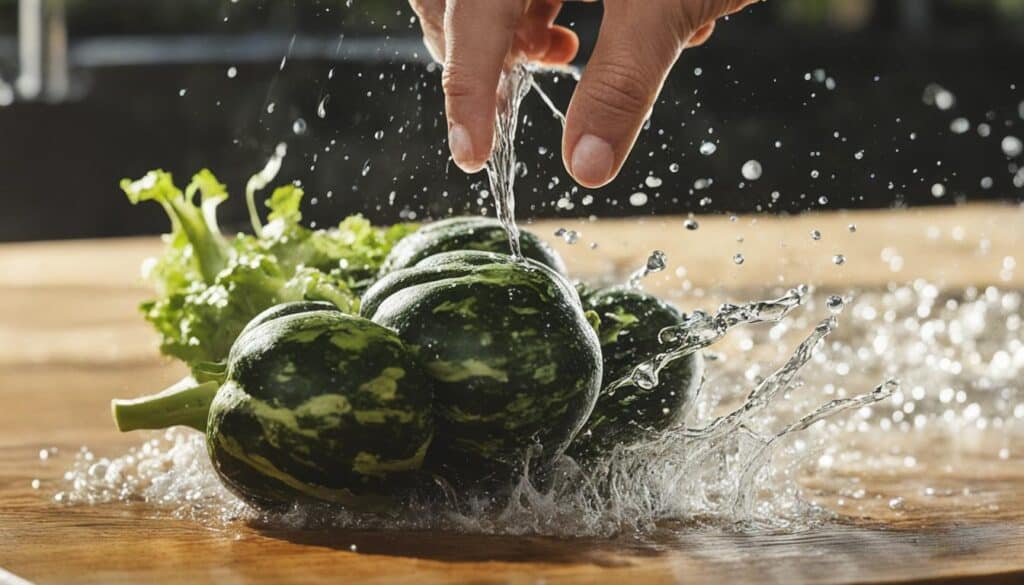
“Washing organic produce is equally important as washing conventionally grown fruits and vegetables. It helps remove dirt, bacteria, and pesticide residues that may be present on the surface.”
By washing organic produce, you can ensure that you are removing any potential contaminants and enjoy a cleaner and safer eating experience. Additionally, washing organic fruits and vegetables can also help preserve their freshness and extend their shelf life.
When washing organic produce, follow the same best practices as you would for conventionally grown produce. Rinse the fruits and vegetables under running water, making sure to rub or brush them gently to remove any dirt or residues. Avoid using soap, detergents, or commercial produce washes, as these have not been proven to be more effective in removing residues compared to water alone.
When it comes to organic produce, the focus is on reducing pesticide exposure and promoting sustainable farming practices. By washing organic fruits and vegetables, you can further support these efforts and enjoy the benefits of organic produce while minimizing potential risks.
Remember, whether it’s organic or conventionally grown, washing fruits and vegetables is an essential step in maintaining food safety and reducing pesticide residues. So, make it a habit to wash your produce thoroughly before consumption, and enjoy the goodness of fresh and clean fruits and vegetables.
Common Pesticides Used on Fruits and Vegetables
Various types of pesticides, including herbicides, fungicides, insecticides, and bactericides, are commonly used on fruits and vegetables. These pesticides have specific actions and are designed to control pests and prevent crop damage. Some common pesticides include glyphosate, atrazine, chlorpyrifos, and heptachlor. These pesticides can have harmful effects on health and may be present as residues on fruits and vegetables.
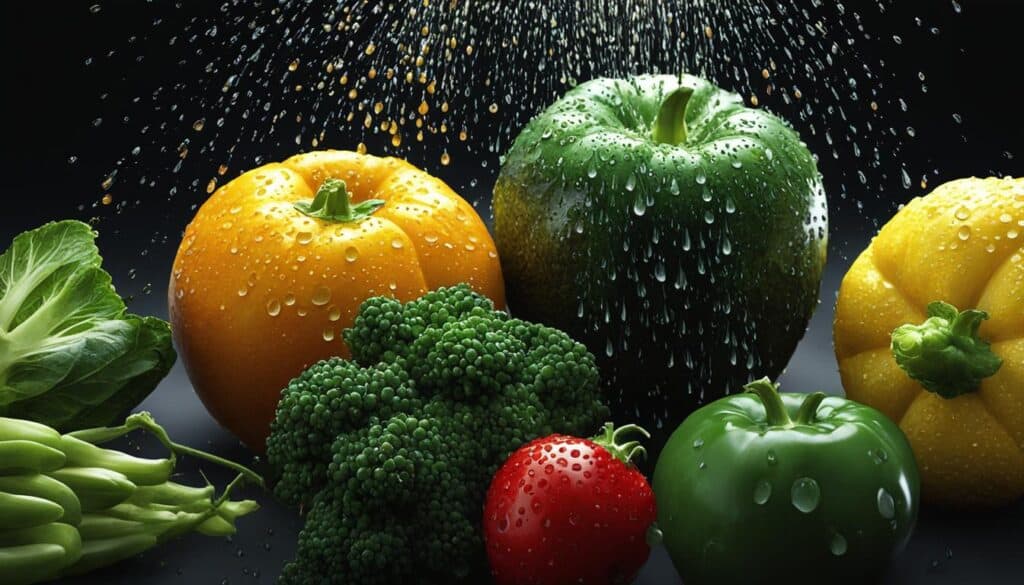
Pesticides are chemical substances that are used to protect crops from pests, diseases, and weeds. They are necessary for agricultural practices to ensure high yields and maintain the quality of fruits and vegetables. However, it is important to understand that the use of pesticides can have potential health and environmental implications.
Here are some common types of pesticides used in fruit and vegetable production:
| Pesticide Type | Description |
|---|---|
| Herbicides | Used to control or eliminate weeds. |
| Fungicides | Used to prevent or control fungal diseases. |
| Insecticides | Used to kill or repel insects and their larvae. |
| Bactericides | Used to control bacterial diseases. |
These pesticides work by targeting specific pests or diseases, disrupting their life cycles, or inhibiting their growth. While they are effective in their intended purpose, they can also pose risks to human health and the environment.
It’s important to note that pesticide residues can remain on fruits and vegetables even after washing. The use of pesticides is regulated by government agencies such as the Environmental Protection Agency (EPA) and the United States Department of Agriculture (USDA), who set limits on the amount of pesticide residues allowed on crops. These limits, known as tolerances, aim to ensure that the levels of pesticide residues in food are safe for consumption.
Health Concerns
Pesticides can have harmful effects on human health. Prolonged exposure to high levels of pesticides or repeated exposure to low levels of pesticides can lead to various health issues. Some of the health concerns associated with pesticide exposure include:
- Acute toxicity
- Chronic toxicity
- Developmental and reproductive problems
- Endocrine disruption
- Neurological disorders
- Cancer
It is important to be aware of the potential risks associated with pesticide residues on fruits and vegetables and take appropriate measures to minimize exposure.
Negative Effects of Toxic Pesticides
Some pesticides, particularly persistent organic pollutants (POPs) like DDT, have been linked to serious health effects such as cancer, diabetes, hormone disruption, and neurological diseases. These harmful pesticides may still be present in the environment, despite being banned in many countries. It is important to be aware of the potential negative side effects of these toxic pesticides.
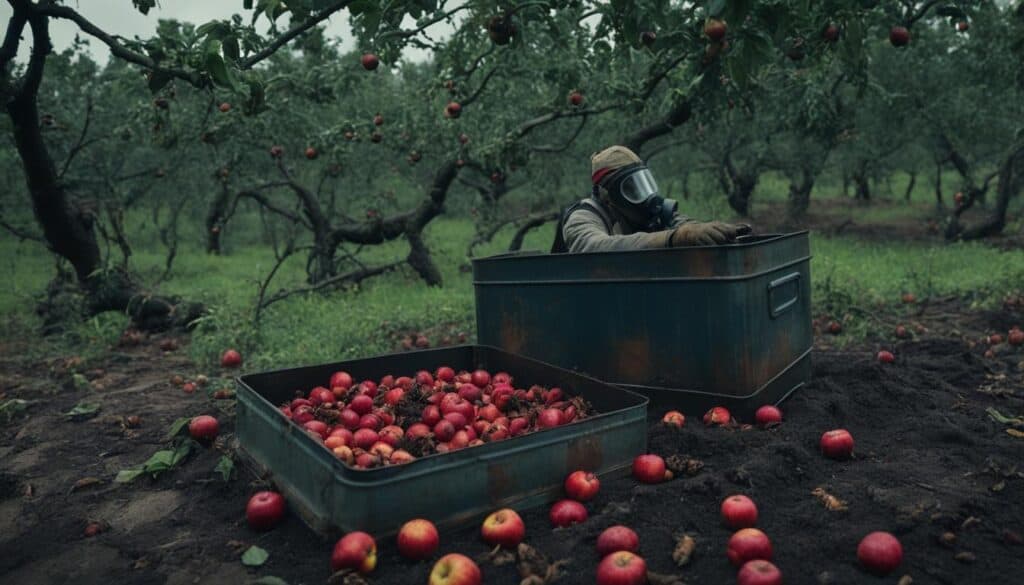
Exposure to harmful pesticides can have detrimental effects on our health. Certain pesticides, such as DDT, belong to a class of chemicals known as persistent organic pollutants (POPs). These toxic substances stay in the environment for extended periods and can accumulate in the food chain, posing a threat to human health.
Research has shown that long-term exposure to POPs, like DDT, is associated with an increased risk of various health issues:
- Cancer: Pesticides like DDT have been linked to an increased risk of cancer, including breast, prostate, and lung cancer.
- Diabetes: Exposure to certain pesticides, including POPs, has been linked to an increased risk of developing type 2 diabetes.
- Hormone Disruption: POPs can interfere with the body’s endocrine system, leading to hormonal imbalances and associated health problems.
- Neurological Diseases: Pesticide exposure, especially to organophosphates, has been linked to neurodevelopmental disorders, cognitive impairments, and neurodegenerative diseases like Parkinson’s.
Despite the bans placed on harmful pesticides like DDT in many countries, their persistence in the environment continues to pose a threat to human health. It’s crucial to raise awareness about the potential health risks associated with these substances and advocate for safer alternatives in agriculture.
Natural Methods to Remove Pesticides
When it comes to removing pesticides from fruits and vegetables, natural methods can provide effective solutions. These methods offer an alternative to conventional washing and can help reduce pesticide residues on your produce. Here are three natural techniques that you can easily implement:
Salt Water Soak
One simple and effective method is to soak your produce in a 10% salt water solution. The salt water soak helps to remove common pesticide residues. To use this method, follow these steps:
- Fill a basin with water.
- Add salt to the water at a ratio of 10% (e.g., 1 cup of salt for every 10 cups of water).
- Place your fruits or vegetables in the salt water solution.
- Soak them for approximately 20 minutes.
- Rinse thoroughly with clean water before consuming.
Bicarbonate of Soda Soak
Another effective natural method is using bicarbonate of soda (baking soda) to remove pesticide residues. The alkaline properties of baking soda help break down and remove these residues. To use this method:
- Fill a basin with 2 cups of water.
- Add 1 teaspoon of bicarbonate of soda to the water and stir until it dissolves.
- Place your produce in the baking soda solution.
- Let it soak for about 15 minutes.
- Rinse thoroughly with clean water.
Vinegar Soak
Vinegar is another effective natural ingredient that can help remove pesticide residues. The acidic nature of vinegar helps break down and eliminate these residues. To use this method, follow these steps:
- Mix 1 part vinegar with 4 parts water in a basin.
- Submerge your produce in the vinegar and water solution.
- Allow it to soak for approximately 20 minutes.
- Rinse thoroughly with clean water before consuming.
While these natural methods are effective in removing pesticide residues, it’s essential to be cautious with porous fruits like berries. Extended soaking may cause them to become soggy, affecting their texture. Therefore, adjust the soaking time accordingly for different types of produce.
Try incorporating these natural methods into your produce preparation routine to reduce pesticide residues and enjoy cleaner, healthier fruits and vegetables.
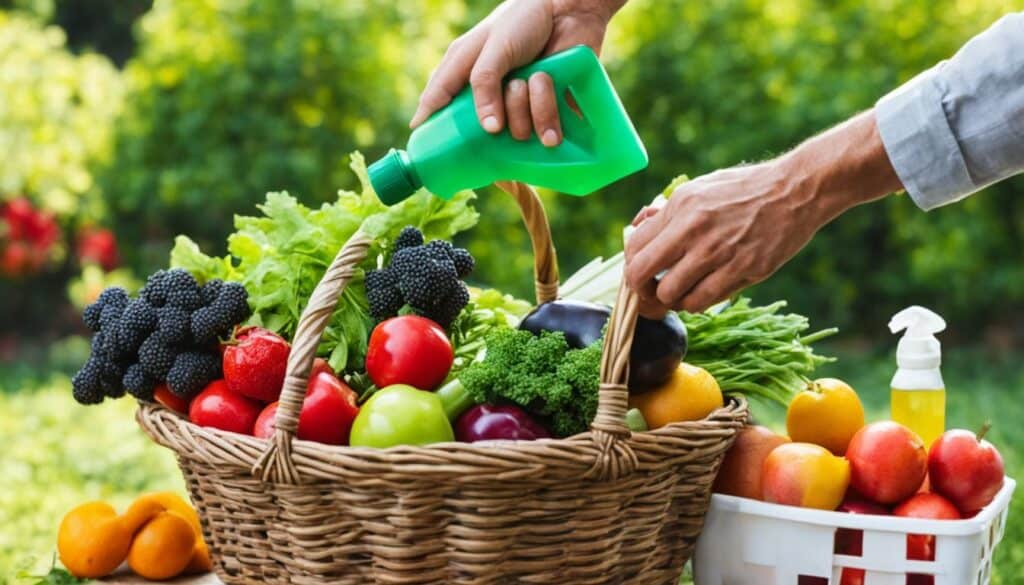
| Natural Method | Effectiveness | Soaking Time |
|---|---|---|
| Salt Water Soak | Effective against common pesticide residues | 20 minutes |
| Bicarbonate of Soda Soak | Effective in removing pesticide residues | 15 minutes |
| Vinegar Soak | Effective in breaking down pesticide residues | 20 minutes |
Washing Tips for Safe Consumption
When it comes to enjoying your fruits and vegetables, washing them thoroughly is crucial for both your health and peace of mind. Even if produce is labeled as pre-washed or organic, it’s always important to take that extra step and wash them yourself. This applies to all types of produce, including bagged salads. Let me share some essential washing tips to ensure safe consumption:
- Rinse under running water: Place your fruits and vegetables under running water and gently rub them with your hands. This simple yet effective method helps remove pesticide residues, bacteria, and dirt.
- Pay attention to bagged salads: While bagged salads are convenient, they may contain bacteria that could pose a risk if not properly washed. Manufacturers often use chlorine and bleach when washing bagged salads, which means it’s essential to remove any chemical residue by rinsing the salad components under running water.
By following these washing tips, you can help remove pesticide residues, bacteria, and dirt from your fruits and vegetables, ensuring safer consumption for you and your family.
Why It’s Important to Wash Your Produce
“Washing your fruits and vegetables removes pesticide residues, bacteria, and dirt, ensuring safer consumption and peace of mind.” – (Your Name)
The Importance of Washing Fruits and Vegetables
When it comes to maintaining food safety and reducing pesticide residues, washing fruits and vegetables is of utmost importance. Whether you buy your produce from the farmers’ market, grow it in your home garden, or purchase it from the grocery store, washing can help remove dirt, germs, and pesticide residues that may be present.
Properly washing your fruits and vegetables can help ensure that you and your family enjoy safe and pesticide-free produce. Here are some key reasons why washing is crucial:
- Removing dirt and contaminants: Before consuming fruits and vegetables, it’s essential to eliminate any dirt, soil, or other external contaminants that could be present. Washing with water can effectively remove these particles, providing a cleaner and safer eating experience.
- Reducing pesticide residues: Washing under running water can help reduce pesticide residues on the surface of fresh produce. While it may not eliminate all residues completely, it can significantly decrease their presence. By washing your fruits and vegetables, you can minimize your exposure to pesticides and protect your health.
- Enhancing food safety: Bacteria and other harmful microorganisms can sometimes be found on the surfaces of fruits and vegetables. Washing them under running water can help get rid of these pathogens, reducing the risk of foodborne illnesses.
By incorporating the habit of washing your fruits and vegetables into your daily routine, you can take a proactive step towards maintaining food safety and minimizing pesticide residues. It’s a simple and effective practice that can benefit your overall well-being.
Pesticide Residue Levels in Washed vs. Unwashed Produce
| Produce | Pesticide Residue Level (Unwashed) | Pesticide Residue Level (Washed) |
|---|---|---|
| Apples | 0.050 mg/kg | 0.015 mg/kg |
| Carrots | 0.030 mg/kg | 0.010 mg/kg |
| Strawberries | 0.080 mg/kg | 0.025 mg/kg |
Note: The table above showcases pesticide residue levels in common produce before and after washing. The washed values indicate the reduced residue levels achieved through proper washing methods.
Remember, while washing your fruits and vegetables is a crucial step in reducing pesticide residues and promoting food safety, it’s important to note that no washing method is 100% effective in removing all residues. However, by following best practices for washing produce, you can significantly reduce your exposure to pesticides and maintain a healthier lifestyle.
Conclusion
After exploring the various methods of washing fruits and vegetables to reduce pesticide residues, it is clear that effective fruit washing is essential for pesticide-free snacking and safer consumption. While no washing method can guarantee complete removal of all residues, washing under running water and rubbing produce can significantly reduce pesticide residues present on the surface.
Peeling and heating are additional techniques that can eliminate residues, but they may also result in the loss of important nutrients. It is important to strike a balance between pesticide removal and preserving the nutritional value of the fruits and vegetables.
Natural methods such as salt water soaking, bicarbonate of soda, and vinegar soaking provide alternative ways to aid in pesticide removal. These methods offer pesticide-free snacking options, ensuring that you can enjoy your favorite fruits and vegetables with peace of mind.
Whether your produce is organic or conventionally grown, washing is crucial. By following proper washing practices, you can reduce pesticide residues, remove dirt, germs, and ensure a healthier snacking experience. So remember, always wash your fruits and vegetables thoroughly before consuming them for a pesticide-free and safer snacking habit.
FAQ
Does washing fruit remove pesticides?
Washing fruits under running water can help reduce pesticide residues. However, no washing method is 100% effective in removing all pesticide residues.
What are pesticide residues?
Pesticide residues are chemicals left on fruits and vegetables after they are sprayed with pesticides during farming.
How are pesticide residues regulated?
The FDA, USDA, and EPA set tolerances, which restrict the amount of pesticide residue allowed on foods to ensure food safety.
What is the best way to wash fruits and vegetables?
The FDA recommends washing under running water, using a clean brush for firm produce. Washing with soap or commercial produce wash is not necessary.
Can peeling remove pesticide residues?
Peeling can help remove pesticide residues, but it may also result in nutrient loss. Heating produce can also eliminate residues, but it may affect nutrient content.
Should I wash organic produce?
Yes, washing organic produce is still important to remove dirt, bacteria, and pesticide residues that may be present.
What types of pesticides are used on fruits and vegetables?
Herbicides, fungicides, insecticides, and bactericides are commonly used on fruits and vegetables to control pests and prevent crop damage.
What are the negative effects of toxic pesticides?
Some pesticides, particularly persistent organic pollutants (POPs) like DDT, have been linked to serious health effects such as cancer, diabetes, and hormone disruption.
Are there natural methods to remove pesticides?
Soaking produce in salt water, bicarbonate of soda, or vinegar solutions can help remove pesticide residues, but be cautious with porous fruits like berries.
Should I wash pre-washed or bagged salads?
Yes, it is recommended to wash pre-washed or bagged salads to remove any pesticide residues, bacteria, or chemical residue from the washing process.
Why is washing fruits and vegetables important?
Washing fruits and vegetables is crucial to reduce pesticide residues, remove dirt and bacteria, and ensure food safety.

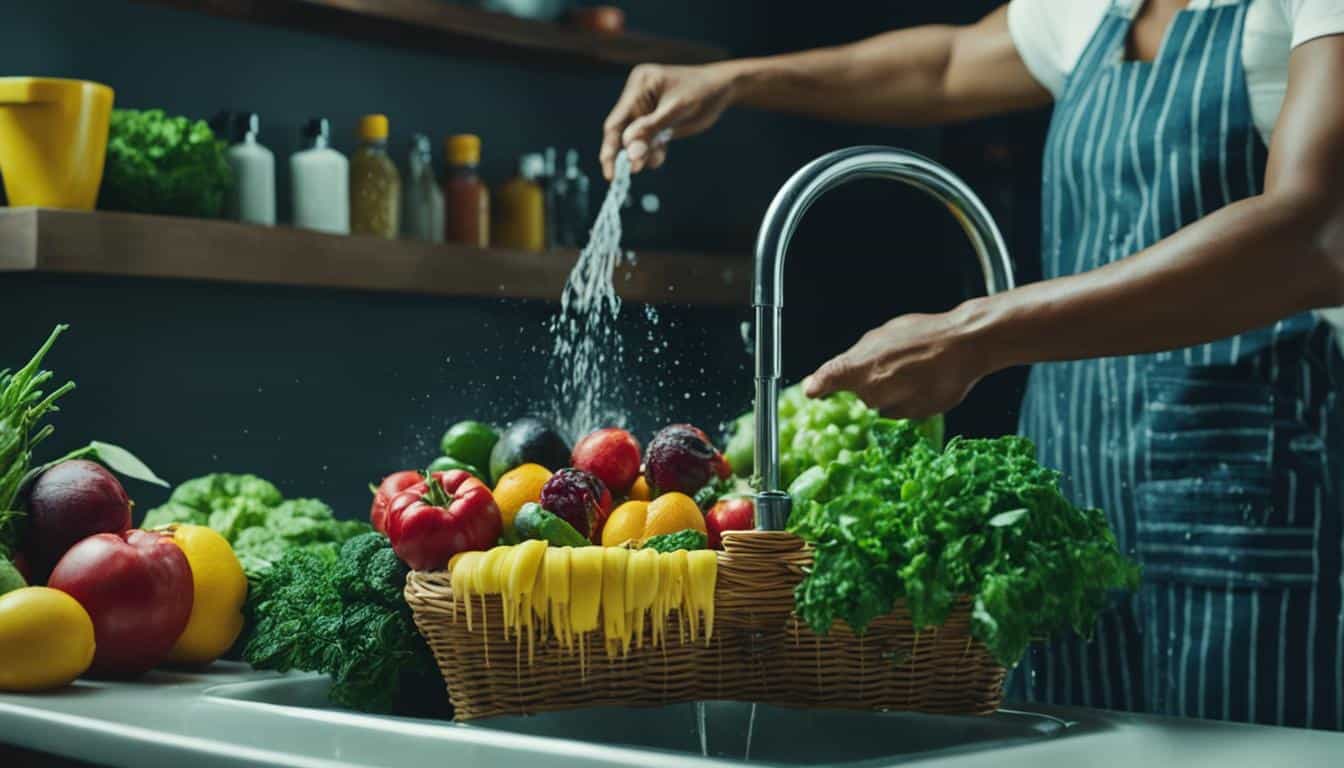



Leave a Reply